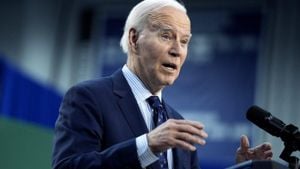On November 13, 2024, Universitas Indonesia (UI) made headlines with its unexpected announcement: the suspension of Bahlil Lahadalia’s doctoral graduation from the university. This decision, taking place after consultations within four significant UI bodies, raises grave concerns over academic integrity and governance, not just for UI but for the entire Indonesian higher education sector.
The Minister of Energy and Mineral Resources, Bahlil Lahadalia, found himself at the center of this academic storm. Lahadalia, who also serves as the General Chairman of Golkar, was expected to complete his doctoral studies at the Faculty of Strategic and Global Studies (SKSG) at UI. But what led to this momentous decision? According to the announcement, the suspension aligns with the university’s emphasis on maintaining rigorous academic standards.
The university cited adherence to Rector Regulation No. 26, which governs these academic processes, and expressed regret for the failures noted within its own internal governing procedures. UI’s statement also included an apology to the public, acknowledging the internal issues contributing to this suspension.
Discussions around the suspension have sparked intense conversations about what this means for UI’s commitment to transparency and ethical standards. Some observers argue this is necessary for restoring faith and accountability within academia, as this incident sheds light on potential systemic flaws. The broader academic community is now questioning how such ethical violations can affect students and future researchers.
During the period leading up to the announcement, UI had undertaken extensive evaluations of its doctoral program, emphasizing the importance of adhering to ethical governance practices. The university outlined plans for comprehensive audits of its academic programs and affirmed its dedication to enhancing transparency moving forward.
Bahlil expressed some confusion surrounding the reasoning behind the suspension. Speaking to reporters, he noted he was unsure of the details of UI's decision but acknowledged receiving notification of the decision. "I don’t know the contents yet. But what is clear is the recommendation may have been obtained, I have received it," he remarked, indicating he plans to discuss this matter directly with the university. He also pointed out there were necessary adjustments needed for his dissertation before it could be deemed complete and affirmed the graduation ceremony was potentially still set for December.
"From what I understand, it is not suspended, but rather my graduation is meant to be held pending some judicial matters, which are expected to be resolved by December," Lahadalia clarified. His dissertation involved significant research on governance related to sustainable nickel downstreaming, hinting at the grave nature of academic standards involved.
This controversy has raised concerns beyond just one individual and has reignited discussions around the integrity of higher learning institutions across Indonesia. UI’s commitment to address these ethical concerns head-on reflects the kind of vigilance needed to uphold academic values. Are these measures enough to restore public confidence, or is this just the beginning of broader reform?
The gravity of this situation cannot be overstated as it brings much-needed attention to the governance of doctoral programs nationwide. Institutions may feel compelled to reevaluate their processes and standards, ensuring external and internal review mechanisms are sufficiently thorough and transparent. With new admissions temporarily suspended, UI is solidifying its commitment to safeguarding academic integrity.
To address these complications, UI is establishing task forces to investigate the ethical dimensions of its academic processes. This initiative includes reviewing student admission requirements, guidance processes, and graduation prerequisites, marking a considerable effort to detail where shortcomings occurred.
For students at UI and elsewhere, this incident raises pressing questions about how academic institutions uphold ethical standards and what protocols are enacted to secure these principles. Many students may now be left feeling uneasy about their academic futures, questioning the reliability of their degrees and their institution’s practices.
Critically evaluating this suspension's reverberations, the educational community must remain responsive and proactive. This moment should serve as both cautionary and motivational. While some view these steps as reflective of weaknesses within the Indonesian academic system, others see opportunities for reform and improvement.
Universitas Indonesia’s actions should be viewed through the lens of necessary vigilance and accountability. The academic integrity at stake extends beyond individual careers to encompass the overall authenticity of educational achievements within Indonesia. Bahlil Lahadalia, as much as he’s entrenched within governmental structures, is also on the frontline of what this means for the future of Indonesia’s academic viability.
While this situation is still developing, the education community and the public are watching closely. Each move from Lahadalia and UI will be closely examined as this saga continues to unravel, making it clear the issues surrounding academic integrity will require long-term commitment and engagement. To what extent will these movements reshape the ethos of Indonesian academia? Only time will tell.
Overall, the suspension of Bahlil Lahadalia’s graduation is poised to be pivotal for not only him personally but also for the broader academic framework within Indonesia. The serious measures from Universitas Indonesia demonstrate the institution's readiness to confront its internal challenges amid rising ethical scrutiny. Is this the dawn of renewed integrity, or simply another episode of governance failure?



